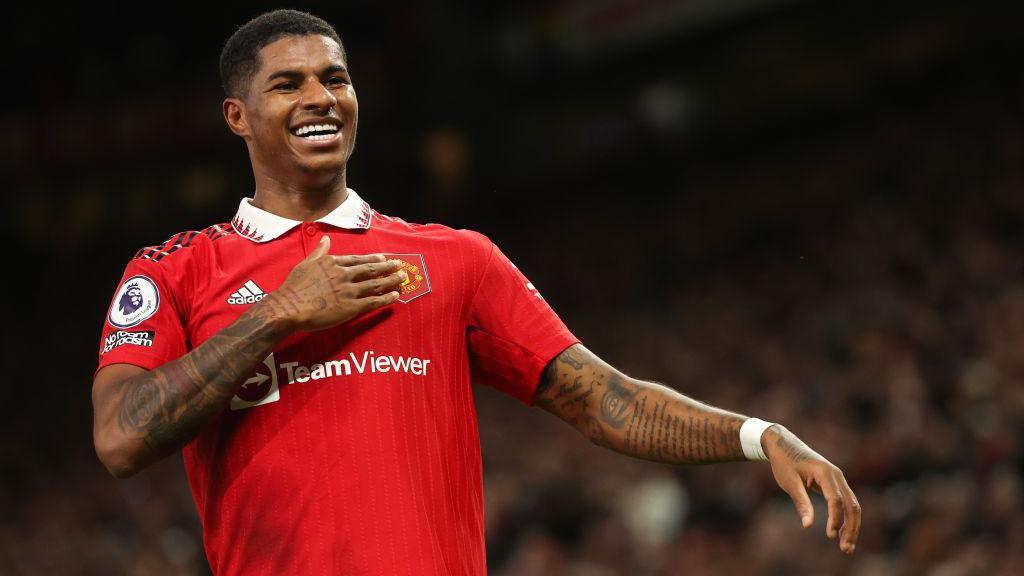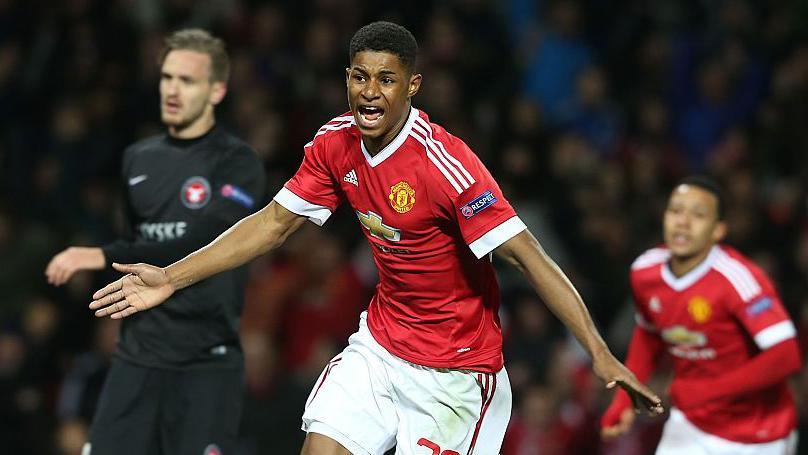Why Rashford is 'lightning rod for criticism'

- Published
It feels like Marcus Rashford is a lightning rod for criticism, and always has been. The question is, why?
At the moment everyone is talking about him because Manchester United's new manager Ruben Amorim left him out of his squad for Sunday's derby, and then Rashford came out and said he is ready for "the next steps" in his career.
But when you take a step back from his current situation and uncertain future at Old Trafford, it does feel like he has always been judged differently to most other players - starting with the reaction to his form on the pitch.
Part of that is essentially just because of who he is. He is Marcus Rashford, Manchester United academy graduate. He is also one of the club's top earners and it is perceived that he should be doing a lot better than he is.
You hear all about how good he was, say, a couple of years ago, and people ask why he is not the same now.
But while there are always players who fall out of form, there doesn't seem to be the same sense of resentment towards them that Rashford gets when his performance levels dip.
And of course the other thing about Rashford is that, whenever people talk about how he is playing, there is always a discussion about what he does off the field as well.
That is where his treatment really does become unfair in my opinion. Everyone seems to have made their mind up about his character, but in reality how many people actually know him?
Who is the real Rashford?
I just want to help Marcus - Amorim on Rashford
I think his team-mates know Rashford, and the people close to him do too - but everyone else? Not so much.
Instead, their perception is almost from a PR perspective, where the moment someone says something negative about him it seems very easy to believe. Sometimes it even feels like people really want to believe it.
That's when you get this consensus along the lines of "he's not playing well because he doesn't care" or "he's focused on his lifestyle instead of his football".
But other than a handful of well-known incidents which have been spoken about and handled by whoever was United's manager at the time, the rest is just speculation.
He is certainly not doing things chronically wrong on anything even vaguely approaching a regular basis, but it is still hinted that his behaviour and character is consistently at fault and people just take that as gospel.
I should make it absolutely clear here that I don't know Marcus either. I don't know what he is like at training, or when he is away from the team. I am also sure that, like most other players I do know, he is not perfect.
I am certainly not defending him for the instances where he missed training or was late for a team meeting, but it is almost nine years since he broke into United's first team and the way he is portrayed feels out of proportion to the frequency of those incidents.
When you weigh everything up like that, I am not surprised Rashford says he is "misunderstood".
The idea he doesn't care makes things worse

Rashford has scored 138 goals in 426 appearances for Manchester United. He is shown here celebrating his 100th goal for the club, against West Ham in October 2022
I don't know him as a person but, when I watch him, I can see that for Marcus Rashford, happiness seems to exist when he is playing football for United, and he is playing well.
A lot of the criticism of him has come from United fans, which is fine in itself, but I think they sometimes forget they have got more in common with him than any other player in that team.
He is from Manchester, and supports United - like them, he is a fan as well.
That does not mean they should just give him endless amounts of support but there are times when he could clearly do with an arm around his shoulder.
Instead, the hostility and abuse towards him is so high at times, it feels extreme. Again, it does not marry up with the amount of praise he receives when he is playing well.
I think what makes it worse for him is this idea that he doesn't care. When you're given that label as a player, then some people will always believe it - and it's even worse when you're a homegrown player, because a lot of supporters believe you should feel the same way about the club as them.
So, while he might go through a spell where he plays better, his critics are almost waiting for him to have a bad game - and their reaction is always the same: it should matter more to him because he's a United fan, but he's showing a lack of effort, or a bad attitude.
Rashford's utopia is still Old Trafford

Rashford scored twice on his senior Manchester United debut - a 5-1 Europa League win over FC Midtjylland at Old Trafford in February 2016 when he was 18
Rashford is 27 now, and I've heard people argue that, at his age, he is not going to change.
I am not sure he needs to, but I would definitely describe him as someone who is firmly attached to this Manchester United era.
By that, I mean his time in the United first team has been very different to most of the young players who came through the ranks there in the years before him.
The 'Class of 92' is always seen as the modern-day marker in that respect, but more recently Jonny Evans, Danny Welbeck and Darren Fletcher came through the ranks to break into successful Manchester United teams and won Premier League titles. It was a lot easier for them.
Rashford's era has been very different. He has still won trophies, but since his debut in 2016 United have never come close to being champions. They have been far too inconsistent for that, but good or bad he has always been one of the big talking points of this team - as he is now.
What happens next is going to be very interesting. Amorim has said this situation is not down to discipline, but this is the first time in Rashford's career where his day-to-day character has been actively discussed by his manager rather than just by fans or the media.
So this is different, and it is why we are at the stage where Rashford is speaking openly about a "new challenge" - but he does not have to leave OId Trafford for that.
If he is going to move on it would have to be a deal that suits everyone - his fee from the club's point of view and, for him, his wages, and where he wants to play.
I think there's still only really one answer to that last question, and surely United fans would agree.
He's a Red at heart. He's been at his boyhood club since he was seven and his utopia is to be playing every week for Manchester United, winning trophies and taking them back to where he feels they should be.
Nedum Onuoha was speaking to BBC Sport's Chris Bevan.